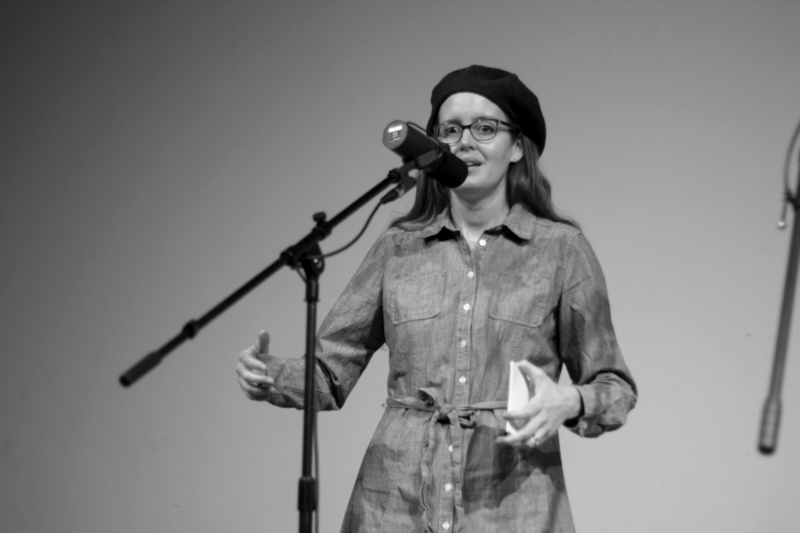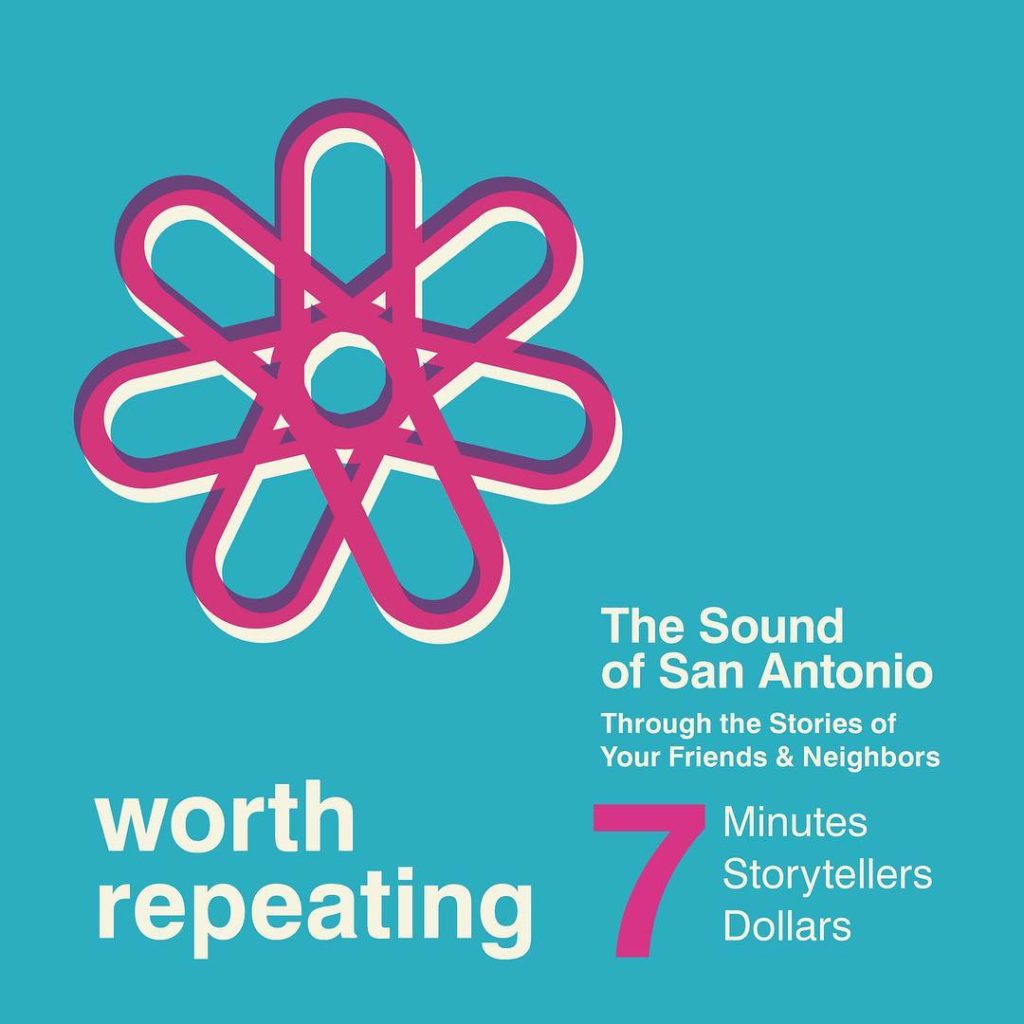
Roberto Martinez
My son’s autism diagnosis has been one of the defining experiences of my life. On October 2, 2018, I shared that story at the “Suckerpunch” episode of Worth Repeating, a recurring storytelling event organized by Texas Public Radio at Brick at Blue Star. I’ve been carrying the story inside me for years, sharing it in bits and pieces. The challenge of finding the right school for my autistic son—and his neurotypical sister—motivated me to create the San Antonio Charter Moms blog and online community. Sharing my personal story felt vulnerable, but was also cathartic, and brought me closer to the live audience at Brick and also the people who commented and shared my story online.
At Texas Public Radio, you can listen to the eight-minute audio of my story: “Inga Wanted More For Her Son.”
Here is a transcript of my story.
“The biggest hit that I took in my life was my son’s autism diagnosis. But this may not be the story you are expecting to hear. This is not a story about grief about the things my son can’t do. Instead, it’s about how I have fought the expectations that people have for him that are too low. People see the label, and they set their expectations way too low for him. And that’s what I keep fighting. I’ve heard it called ‘the belief gap,’ between what people are capable of, and where [other] people think they are, just because of a label.
“Let me tell you a little bit about my family. My husband’s name is Mike, [and] we have two kids. My son is eleven years old now. We also have a daughter who is eight years old now. My son—when did we know he was different? Basically, from the delivery room. The nurses picked him up, cleaned him up, got the mucus and the blood out of his lungs. They were just taken with how he looked at them. He had this sweetness and this presence even as a newborn. Some of y’all are parents, there’s a feeling when you first hold your child, and this intensity you feel. You want them to have the best possible future. It’s the most intense feeling. You will do anything for them. You will fight for them. That’s from the beginning.
“We came home from the hospital. We were trying to breastfeed, trying to get his mouth on there. It wasn’t going quite right and I was freaking out. Thankfully, my mom lives in town, and she went to the baby store and got a breast pump, and we were off to the races. The point of this is that my son is a big, healthy, active kid. Picture him: he’s eleven and he’s almost as tall as I am. He grew really fast when he was an infant. Thank goodness for the breast pump. What I found out later was that—his mouth not quite getting it—that actually can be a sign of autism. Those little things. Even just a few days old, and he was already different, but I was going to find a way to make it work.
“When he was a toddler, one of the great things about him was that he would try, and try, and try, and just never give up until he got it. Whether it was picking up a ring, rolling over, pulling up on something, learning to walk, he just would never give up. That gave me a great feeling of pride. In life, that’s a great quality: if you set your sights on a goal, and you keep trying and you don’t give up. He already had that, even as a young kid.
“Sometimes that is considered a bad quality. Let’s say a child is in school, and they are doing something they love, and the teacher says, ‘OK, time’s up, time for the next unit,’ and the child doesn’t want to transition. That’s one of the things where something that serves you well in life might not serve you well in school. That’s kind of the story of our lives lately.
“One of the things he was fascinated with was letter shapes and letter sounds. When he was three, he grabbed some sidewalk chalk and drew the alphabet on the sidewalk, each letter about this tall [about 2′]. He did it once and then, ‘I’m done. I showed you I can do the alphabet.’ He taught himself how to read when he was four. He was just really fascinated with words, and sounds, and how to read.
“When he was about two, a friend of mine wrote a blog post about her son going into speech therapy. She said, ‘This is his vocabulary.’ (I’m expanding my hands, radio people.) This is what a vocabulary would be for a typical two year old. I remember thinking, ‘Well, how many words does my son use with me?’ I ran down a list and thought, ‘Oh, he’s fine.’ What I didn’t realize was that he used those words with me, but he wasn’t using those words for people outside the family. When he was at preschool, he never talked. I was like, ‘Wait, what? He doesn’t talk at preschool? Really?’ It’s just a matter of perspective.
“I thought I knew what autism was, but in my mind I was thinking about severe autism, like people who are non-verbal, or people who have great difficulty reading emotions in other people. My son is a very loving person. He’s always very patient with his younger sister. He has strong bonds with me, my mom, my sister, and people in our family. And then, looking at our extended family, nobody else in the family has a formal autism diagnosis, but . . . we’re kind of oddballs, right? And there’s traits that, looking back, like how my grandfather didn’t talk until he was three years old. Things you put the pieces together later.
“When my son was about two, the in-laws came to visit for a long weekend, and then they left. The next morning, I checked in with my husband, and he had stayed up all night on Dr. Google freaking himself out. I needed to kind of talk him down from that. We looked at the situation very differently.
“I have always had an unshakeable faith that my son had great potential. But people would come to me and say, ‘Maybe they will find a cure.’ A cure? I don’t want a cure. I like him the way he is. I want him to function in society, but I don’t want to cure him. I don’t need sympathy. He’s my son; I love him.
“My husband and I had a lot of conflict about how to deal with this. I resisted getting the autism diagnosis. I was wrong. But what I was afraid of was that once he had the diagnosis and had the label, that people would lower their expectations for him. And that was exactly what happened. My fears came true. I wound up withdrawing my son from kindergarten. It was one of the most painful and bitter experiences of my life. He had teachers who thought he was just dumb. There were parents who wouldn’t invite the special ed kids to birthday parties.
“I just wanted people to have faith in me that I knew my son and I was going to do what he needed to do. So I wound up homeschooling. There were people who didn’t think I could do it. So, all right, I’ll go visit some private schools and see what’s going on. A lot of private schools don’t want to deal with kids in special education. I just kept fighting for my son.
“It turned out to be a good year of homeschooling. We went out in the community, we visited lots of different places, he went into lots of stressful situations and learned to cope with it, learned to interact with people, learned how to deal with his anxiety around crowds, and we had a great year. Actually getting the diagnosis was hard to deal with, though.
“He’s in a much better situation now. He’s in a school where they do have high expectations for him. He’s doing the same rigorous work that the other students in the school are doing. He’s just come such a long way. I never gave up on him, but to see other people see his potential is very fulfilling for me.
“This experience changed my career. Through my blogging, I advocate for people who are experiencing the belief gap. Just because of a label, don’t set your expectations down here, okay. Look at everybody’s potential and see where they can go. Because there is a lot of untapped potential out there. Thank you.”

Worth Repeating is a recurring event; each happening includes seven storytellers speaking for seven minutes each, and tickets are $7 each. Season four themes include “Alien” (September 4, 2018), “Sucker Punch” (October 2, 2018), “Trapped” (November 13, 2018), “Opportunity Knocks” (December 11, 2018), “Where I Come From” (February 5, 2019), “My Secret Life” (March 5, 2019), and “On A Mission” (April 2, 2019). To pitch your story for Worth Repeating, email worthrepeating@tpr.org. Many thanks to Amanda Reyna, Storyboard member, who encouraged me to submit my story. I also want to thank Paul Flahive for coaching me and Todd Wright for introducing me to the audience, even though I threw him for a loop by wearing small hat rather than a large hat.
Read more:
- “Inga Wanted More For Her Son,” Paul Flahive, Texas Public Radio, October 9, 2018
- “Autism Community Network Helps Families Access Diagnosis and Resources,” Inga Cotton, San Antonio Charter Moms, October 18, 2017
- “ACMB Presents: Autism, A Mother’s Letter,” Erin Kirwan, Alamo City Moms Blog, April 27, 2016